Happy New Year
May your reading be slow and luxurious with no pressure to finish everything. Also an event in Bristol from Ortac and an award for the Ponies and Horses Books.
Attn: Book of the Month Subscribers.
Due to Christmas mail and a hold-up at the printers, December’s book is going out now and next week. It always happens this time of year. Thank you for your patience, especially those overseas.
If you’d like to subscribe to our Book of the Month, here is a list of our books for the year - all money goes to the Republic of Consciousness Prize for Small Presses prize fund. We begin with Not a River by Selva Almeda from Charco Press.
(If you happen to be a Charco subscriber, there replacements to choose from, including in three weeks, the long list of this year’s prize.)
Read Less, breathe more.
Very few people include “Read less” among their New Year’s Resolution, but it’s top of mine. I’ll break it of course. Or rather, I won’t read less to the degree I’d like to. Just less than this year. The above image actually shows I was down on the previous year, but it doesn’t tell the story.
I do often wonder why we read. Is there any evolutionary fitness to it? Or does it fall under Stephen Jay Gould’s spandrel concept - the decoration of the triangular arches made by two columns and a ceiling, the spaces left over from must-needs elements of evolution?
[I understand the Spandrel notion might be better applied to writing than reading, but it’s all I got.]
There is also Socrates - I think it’s Socrates - who described philosophy as erotic love grown up. That works when applied to reading generally. I certainly fall in love with some books. But it is also the case, I can run out of cognitive space for more reading. Which doesn’t imply a loss of love , if we’re to extend this metaphor, but a kind of emotional exhaustion. I just can’t take in any more writing.
Which is what happened at the end of 2023. I simply couldn’t make sense of what I was reading - sentences seemed confused, plots lacked sense, characters were no more than an arbitrary mix of behaviours. It took me over a week to read Bernard Malamud’s Pictures of Fidelman: An Exhibition, and it’s less than 160 pages.
[I think Malamud’s The Fixer was my favourite novel of last year, or perhaps Singer’s The Slave. But I also love Edna O’Brien’s first three novels.]
While I might usually place the blame on the writer, this time I knew it was all me. I might have only read around 50 regular books in 2023, I read most of at least 100 submissions to Weatherglass Books inaugural novella prize, one of our books for next year at least 7 times, and some of all the submissions to the RofC prize (I’m not a judge) - so I’m going to put the number of completed books around 200, and that includes Orlando Figes The Russian Revolution which makes War and Peace seem slight.
Now, I know a few people for whom that number is a yearly average. But there is a difference in kind rather than degree experience when one’s reading comes with a responsibility beyond one’s own pleasure. Three-quarters of my reading involved some kind of jeopardy for the writer, and a small proportion of that includes jeopardy for Weatherglass. This adds cognitive strain. Editing a book involves so much cognitive stain one really ought end the day in darkly-lit bar sipping an Old-Fashioned. The point here is to be living a different kind of life entirely. The stresses would be the same, but the aesthetic surrounding it would make it worthwhile - a pint in a pub in Tooting isn’t going to cut it.
I had planned to spend a lot of Christmas lying on a sofa listening to music, but I still haven’t finished the work that was going to allow me to do that. The moment I hit send on this, it’s back to editing, which is, as I say, reading at its most intensest. And it’s way too early in the morning for a cocktail.
Ortac Press
Francesca Ramsay and Emily Bootle: Searching for Reality and Authenticity in the Modern World
Wednesday 24th January
Bookhaus, Bristol
18:00-20:00
Join two Ortac authors whose books delve into the impact of the modern world on our lives for an evening of discussion at Bookhaus in Bristol.
PINCH ME: Trying to Feel in the 21st Century by Francesca Ramsay
This is a book about how it feels to exist. About the moments we come off autopilot and engage fully with the world around us. The fleeting moments in which our minds and bodies connect totally to one another and to our environment. Intimate, impassioned and full of humour, PINCH ME follows art historian Francesca Ramsay’s far-reaching journey in search of answers to one of life’s most complex and essential questions: What does it mean to feel real? Tackling this ancient subject through a contemporary lens, PINCH ME is a raw, lyrical reflection on finding connection with oneself, one another and the modern world. Ramsay investigates what it is to experience reality, the reasons so many of us are feeling the lack of it today, and crucially, how we might be able to get it back.
This Is Not Who I Am: Our Authenticity Obsession by Emily Bootle
In contemporary culture, there is no stronger imperative than to be authentic. But what does authenticity actually mean? Everywhere we turn, we are urged to “live our truth”: an element of Western culture that is almost never questioned. Authenticity in all its contexts is becoming more significant than ever as digital culture breeds fakery and capitalism offers the illusion of infinite choice. In this climate, finding and being yourself is a more complex idea than it sounds – one that should not necessarily be taken as doctrine. In this set of six sharp, lively essays, the writer and journalist Emily Bootle explores how authenticity has pervaded every facet of our culture, from modern celebrity and identity politics to Instagram captions and wellness. Blending pop culture and philosophy, this book dismantles the ideology surrounding being ourselves at all costs, and questions what fuels our authenticity obsession.
P&H Books
Ponies and Horses Books have won the Saltire Society Award for Best Book Cover at Scotland’s National Book Award’s 2023 for Rub-A-Dub-Dub by Robert Wringham
Cover Artist: Thomas MacGregor
Cover Designer: Samara Leibner
Rub-A-Dub-Dub is a comic novel about an overworked and anxiety-struck middle aged man who discovers the pleasures and self-care principles of bathing. John Robinson of the culture website Outside Left called it “An extraordinary first novel, comic and poignant”. Comedian Stewart Lee has described Wringham’s previous works as “mini masterpieces.”
Book Banks
This is a new charity founded to bring books to









